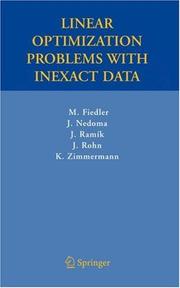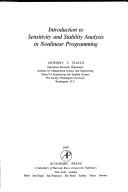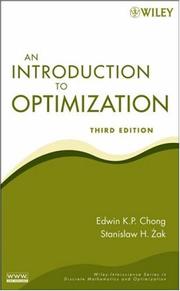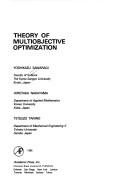| Listing 1 - 10 of 1787 | << page >> |
Sort by
|

ISBN: 1280624019 9786610624010 0387326987 0387326979 Year: 2006 Publisher: New York : Springer,
Abstract | Keywords | Export | Availability | Bookmark
 Loading...
Loading...Choose an application
- Reference Manager
- EndNote
- RefWorks (Direct export to RefWorks)
Linear programming attracted the interest of mathematicians during and after World War II when the first computers were constructed and methods for solving large linear programming problems were sought in connection with specific practical problems—for example, providing logistical support for the U.S. Armed Forces or modeling national economies. Early attempts to apply linear programming methods to solve practical problems failed to satisfy expectations. There were various reasons for the failure. One of them, which is the central topic of this book, was the inexactness of the data used to create the models. This phenomenon, inherent in most practical problems, has been dealt with in several ways. At first, linear programming models used "average” values of inherently vague coefficients, but the optimal solutions of these models were not always optimal for the original problem itself. Later researchers developed the stochastic linear programming approach, but this too has its limitations. Recently, interest has been given to linear programming problems with data given as intervals, convex sets and/or fuzzy sets. The individual results of these studies have been promising, but the literature has not presented a unified theory. Linear Optimization Problems with Inexact Data attempts to present a comprehensive treatment of linear optimization with inexact data, summarizing existing results and presenting new ones within a unifying framework. Audience This book is intended for postgraduate or graduate students in the areas of operations research, optimization theory, linear algebra, interval analysis, reliable computing, and fuzzy sets. The book will also be useful for researchers in these respective areas.
Linear programming. --- Mathematical optimization. --- Optimization (Mathematics) --- Optimization techniques --- Optimization theory --- Systems optimization --- Mathematical analysis --- Maxima and minima --- Operations research --- Simulation methods --- System analysis --- Production scheduling --- Programming (Mathematics)
Book
ISBN: 1281314420 9786611314422 3540785620 3540785612 Year: 2008 Publisher: Berlin : Springer,
Abstract | Keywords | Export | Availability | Bookmark
 Loading...
Loading...Choose an application
- Reference Manager
- EndNote
- RefWorks (Direct export to RefWorks)
Invexity and Optimization presents results on invex function and their properties in smooth and nonsmooth cases, pseudolinearity and eta-pseudolinearity. Results on optimality and duality for a nonlinear scalar programming problem are presented, second and higher order duality results are given for a nonlinear scalar programming problem, and saddle point results are also presented. Invexity in multiobjective programming problems and Kuhn-Tucker optimality conditions are given for a multiobjecive programming problem, Wolfe and Mond-Weir type dual models are given for a multiobjective programming problem and usual duality results are presented in presence of invex functions. Continuous-time multiobjective problems are also discussed. Quadratic and fractional programming problems are given for invex functions. Symmetric duality results are also given for scalar and vector cases.
Mathematical optimization. --- Optimization (Mathematics) --- Optimization techniques --- Optimization theory --- Systems optimization --- Mathematical analysis --- Maxima and minima --- Operations research --- Simulation methods --- System analysis
Book
ISBN: 1489975446 1489975438 Year: 2014 Publisher: New York, NY : Springer US : Imprint: Springer,
Abstract | Keywords | Export | Availability | Bookmark
 Loading...
Loading...Choose an application
- Reference Manager
- EndNote
- RefWorks (Direct export to RefWorks)
This book opens new avenues in understanding mathematical models within the context of a transition economy. The exposition lays out the methods for combining different mathematical structures and tools to effectively build the next model that will accurately reflect real world economic processes. Mathematical modeling of weather phenomena allows us to forecast certain essential weather parameters without any possibility of changing them. By contrast, modeling of transition economies gives us the freedom to not only predict changes in important indexes of all types of economies, but also to influence them more effectively in the desired direction. Simply put: any economy, including a transitional one, can be controlled. This book is useful to anyone who wants to increase profits within their business, or improve the quality of their family life and the economic area they live in. It is beneficial for undergraduate and graduate students specializing in the fields of Economic Informatics, Economic Cybernetics, Applied Mathematics and Large Information Systems, as well as for professional economists, and employees of state planning and statistical organizations.
Economics --- Mathematical optimization. --- Mathematical models. --- Optimization (Mathematics) --- Optimization techniques --- Optimization theory --- Systems optimization --- Mathematical analysis --- Maxima and minima --- Operations research --- Simulation methods --- System analysis --- Economics, Mathematical --- Optimization.
Book
ISBN: 3764313757 3034863306 3034863284 Year: 1983 Publisher: Basel
Abstract | Keywords | Export | Availability | Bookmark
 Loading...
Loading...Choose an application
- Reference Manager
- EndNote
- RefWorks (Direct export to RefWorks)
Operational research. Game theory --- Mathematical optimization --- Optimization (Mathematics) --- Optimization techniques --- Optimization theory --- Systems optimization --- Mathematical analysis --- Maxima and minima --- Operations research --- Simulation methods --- System analysis --- Mathematical optimization.

ISBN: 1282289632 9786612289637 0080956718 0122544501 Year: 1983 Volume: 165 Publisher: New York : Academic Press,
Abstract | Keywords | Export | Availability | Bookmark
 Loading...
Loading...Choose an application
- Reference Manager
- EndNote
- RefWorks (Direct export to RefWorks)
Introduction to sensitivity and stability analysis in nonlinear programming
Nonlinear programming. --- Mathematical optimization. --- Optimization (Mathematics) --- Optimization techniques --- Optimization theory --- Systems optimization --- Mathematical analysis --- Maxima and minima --- Operations research --- Simulation methods --- System analysis --- Programming (Mathematics)
Book
ISBN: 0471917605 0471917613 Year: 1988 Publisher: Chichester
Abstract | Keywords | Export | Availability | Bookmark
 Loading...
Loading...Choose an application
- Reference Manager
- EndNote
- RefWorks (Direct export to RefWorks)
Operational research. Game theory --- Mathematical optimization. --- Optimization (Mathematics) --- Optimization techniques --- Optimization theory --- Systems optimization --- Mathematical analysis --- Maxima and minima --- Operations research --- Simulation methods --- System analysis --- Mathematical optimization

ISBN: 9780471758006 0471758000 Year: 2008 Publisher: Hoboken, N.J. Wiley
Abstract | Keywords | Export | Availability | Bookmark
 Loading...
Loading...Choose an application
- Reference Manager
- EndNote
- RefWorks (Direct export to RefWorks)
Operational research. Game theory --- Mathematical optimization --- 519.6 --- Optimization (Mathematics) --- Optimization techniques --- Optimization theory --- Systems optimization --- Mathematical analysis --- Maxima and minima --- Operations research --- Simulation methods --- System analysis

ISBN: 9780126203707 0126203709 0080958664 9786612702921 1282702920 9780080958668 Year: 1985 Volume: v. 176 Publisher: London Academic
Abstract | Keywords | Export | Availability | Bookmark
 Loading...
Loading...Choose an application
- Reference Manager
- EndNote
- RefWorks (Direct export to RefWorks)
In this book, we study theoretical and practical aspects of computing methods for mathematical modelling of nonlinear systems. A number of computing techniques are considered, such as methods of operator approximation with any given accuracy; operator interpolation techniques including a non-Lagrange interpolation; methods of system representation subject to constraints associated with concepts of causality, memory and stationarity; methods of system representation with an accuracy that is the best within a given class of models; methods of covariance matrix estimation;methods for low-rank
Mathematical optimization. --- Optimisation mathématique --- Optimization (Mathematics) --- Optimization techniques --- Optimization theory --- Systems optimization --- Mathematical analysis --- Maxima and minima --- Operations research --- Simulation methods --- System analysis --- Analyse multivariée --- Programmation (mathématiques)
Book
ISBN: 0691081417 1322883718 0691616833 1400870534 9781400870530 9780691616834 9780691081410 9780691081410 0691644047 Year: 2015 Publisher: Princeton, NJ
Abstract | Keywords | Export | Availability | Bookmark
 Loading...
Loading...Choose an application
- Reference Manager
- EndNote
- RefWorks (Direct export to RefWorks)
This book presents a comprehensive treatment of necessary conditions for general optimization problems. The presentation is carried out in the context of a general theory for extremal problems in a topological vector space setting. Following a brief summary of the required background, generalized Lagrange multiplier rules are derived for optimization problems with equality and generalized "inequality" constraints. The treatment stresses the importance of the choice of the underlying set over which the optimization is to be performed, the delicate balance between differentiability-continuity requirements on the constraint functionals, and the manner in which the underlying set is approximated by a convex set. The generalized multiplier rules are used to derive abstract maximum principles for classes of optimization problems defined in terms of operator equations in a Banach space. It is shown that special cases include the usual maximum principles for general optimal control problems described in terms of diverse systems such as ordinary differential equations, functional differential equations, Volterra integral equations, and difference equations. Careful distinction is made throughout the analysis between "local" and "global" maximum principles.Originally published in 1977.The Princeton Legacy Library uses the latest print-on-demand technology to again make available previously out-of-print books from the distinguished backlist of Princeton University Press. These editions preserve the original texts of these important books while presenting them in durable paperback and hardcover editions. The goal of the Princeton Legacy Library is to vastly increase access to the rich scholarly heritage found in the thousands of books published by Princeton University Press since its founding in 1905.
Mathematical optimization --- Optimization (Mathematics) --- Optimization techniques --- Optimization theory --- Systems optimization --- Mathematical analysis --- Maxima and minima --- Operations research --- Simulation methods --- System analysis --- Mathematical optimization. --- Calcul des variations --- Optimisation
Periodical
Abstract | Keywords | Export | Availability | Bookmark
 Loading...
Loading...Choose an application
- Reference Manager
- EndNote
- RefWorks (Direct export to RefWorks)
Mathematical optimization --- Data processing --- Optimization (Mathematics) --- Optimization techniques --- Optimization theory --- Systems optimization --- Mathematical analysis --- Maxima and minima --- Operations research --- Simulation methods --- System analysis
| Listing 1 - 10 of 1787 | << page >> |
Sort by
|

 Search
Search Feedback
Feedback About UniCat
About UniCat  Help
Help News
News